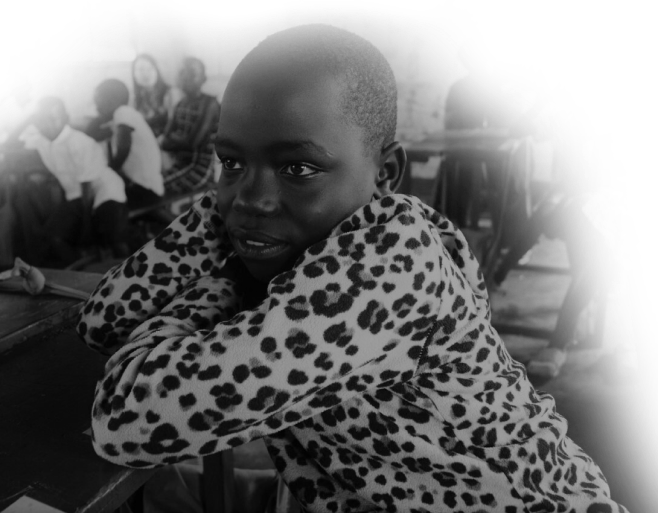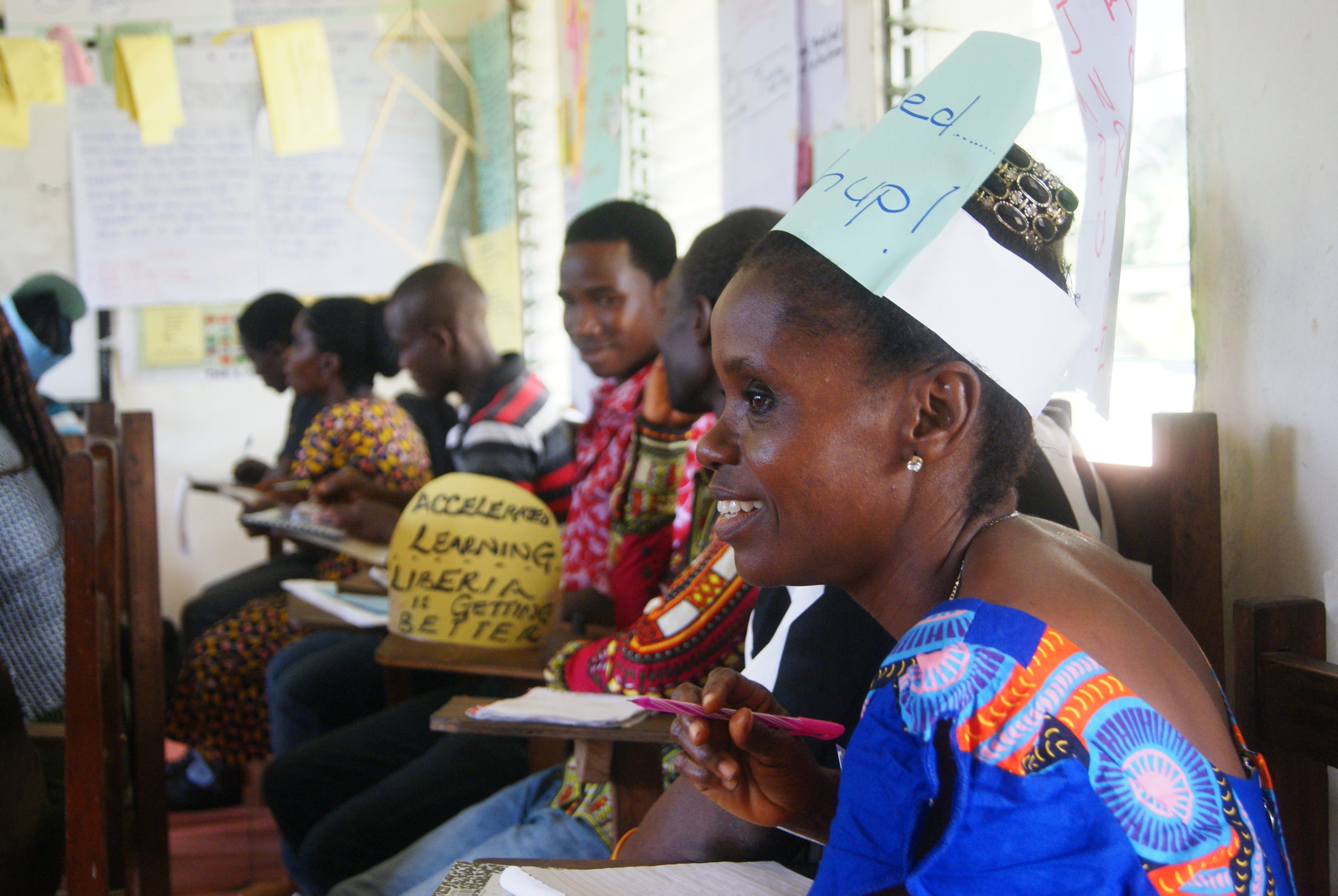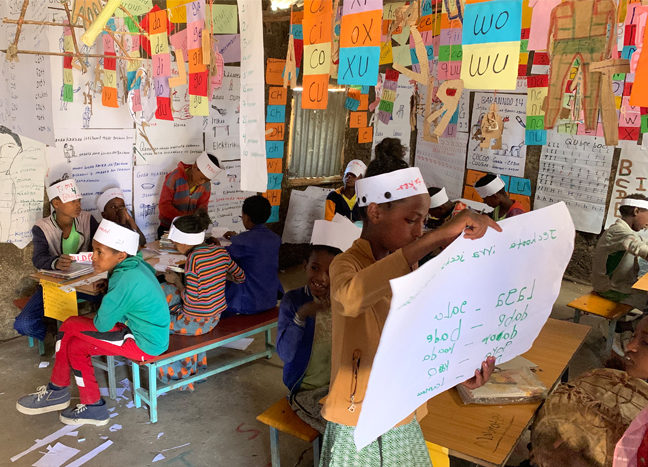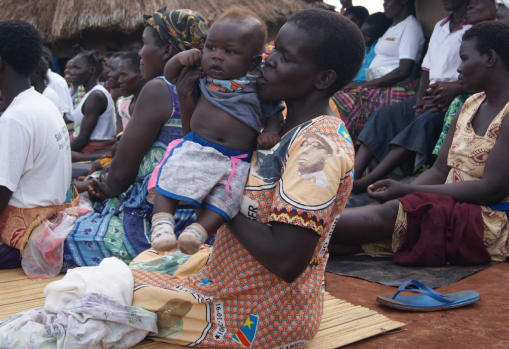The Geneva Global education team has helped bring impactful innovation from the classroom to the system level. We do this using a holistic approach, because improving access and quality in formal education requires concerted effort on all fronts. Among the diverse aspects we cover are teacher training, gender equality and inclusion, pedagogy, parental and community engagement, system planning, workforce development, and curriculum. These come together in our renowned Speed School program but extend far beyond this, as well. Continue reading to learn more about the many ways that Geneva Global can help you make a lasting and meaningful impact in education.

The Speed School Model in Brief
Speed School is an accelerated education program that gives out-of-school children aged 8 to 14 from very poor communities a ‘second chance’ at schooling.
Serving children who either dropped out of primary school before learning to read or calculate or who have never attended school, Speed School provides them the first three years of primary schooling in just ten months.
In Speed School classes, these children acquire the core academic aptitudes, motivation, and confidence to join their age peers in the government school, where many excel. At the same time, the Speed School model strengthens the capacity, confidence, and commitment of the pupils’ mothers to support their children’s onward schooling financially, practically, and morally.
-
The background and scope

Geneva Global (then, the Legatum Fund) first supported the Speed School model as a philanthropic investment in the Stromme Foundation, which originated the model in the West African nations of Burkina Faso, Mali, and Niger. Seizing an opportunity in Ethiopia, Geneva Global (with the ‘blessing’ of Stromme Foundation and funding from Legatum), launched its own Speed School initiative in 2011. Beginning in the country’s Southern Nations’, Nationalities’, and Peoples’ Region (SNNPR), the program has since grown to cover Ethiopia’s four largest regions, adding Amhara, Oromia, and Tigray. As of the 2019/20 school year, Speed School in Ethiopia has brought over 200,000 out-of-school girls and boys back to formal education, of whom over 90% proceed the following year to government school classrooms. The program’s many outcomes are achieved because of the generosity of a few key philanthropic partners. (Learn more about Speed School in Ethiopia here.)
In 2016, one of Speed School’s anonymous funders doubled its investment in the program to permit Geneva Global to expand the program to Uganda’s northern Acholi Region, the area most affected by the country’s civil war. With the 2017/18 school year, Geneva Global introduced the model to Liberia with funding provided by Luminos Fund, which took over the program fully there the following year.
-
The core model
The Speed School model comprises four key components which work together to get out-of-school children into the conventional school system and to keep them there with success:

Speed School classes – In year-long Speed School classes, 30 pupils acquire the core learning competencies and knowledge from the official curriculum for the first three primary grades from (often) a paraprofessional teacher—called a “facilitator”—who uses activity-based, learner-centered instructional methods with continuous formative assessment to prepare learners for future success in learning, life, and livelihood.

Self-Help Groups – Self-Help Groups bring together learners’ mothers (or other guardians) from each Speed School class to provide functional literacy, social mobilization training, and access to greater economic activity to raise the capacity and commitment to take group and individual actions that support their children’s future formal education.

Primary School Capacity-Strengthening – The Speed School program works with local education authorities and agents to help teachers and headteachers at government schools that host Speed School classes to improve their practice by introducing the model’s core pedagogic methods, aiming both to ease the transition of former Speed School pupils into government classes and to reduce the number of future out-of-school children.

Early Childhood Education – In both Ethiopia and Uganda, the Speed School program includes the operation of pre-school classes, also aiming to prevent future out-of-school children. In Uganda, the program previously supported the operation of five community schools as well. With both components, the core approach replicates what the government or other partners are already doing or have done.
Implementation of the Speed School program has been the responsibility of civil society organizations (mostly local) operating across different regions and districts. Geneva Global provides the organizations with grants to apply the full model for each component and continuous oversight and technical guidance to ensure successful performance. The grantee organizations, or ‘collaborating partners,’ hire the Speed School facilitators and Self-Help Group assistants along with the agents who are responsible to supervise, train, and monitor these front-line staff. They serve as the principle interlocutors and advisors to government, securing their authorization and cooperation and mobilizing their active involvement. Lastly, the collaborating partners play key roles in informing the quality control and continued improvement of the core Speed School model and the modalities used to introduce and support the associate methods in practice.
-
Evidence of success

Education and other government leaders at both the central and local levels, external partners, and beneficiaries all agree that Speed School has been a large success. This is evident in a variety of ways, ranging from the performance of individual children to system-level impacts:
- Over 350,000 out-of-school children who have acquired core literacy and mathematic skills
- Around 95% of Speed School completers transition annually to government primary classrooms
- On average, 75% of Speed School completers enter Grade 4 each year and another 15% enter Grade 3
- Former Speed School pupils typically occupy the top ranks of their classes in academic performance, attendance, and progression to higher grades
- Former Speed School pupils are recognized as school leaders and model members of their communities
- Former Speed School pupils receive greater support from their families and articulate clearer ambitions and strategies for their future education or training, lives, and livelihoods
- Many government schoolteachers are independently using Speed School methods in their own instruction
- Mothers of former Speed School pupils are generating additional revenue, saving, and taking other actions to support their children’s continued schooling
- The program is operating with close consultation, coordination, and collaboration with the key local education structures
- The process of government adoption for sustainability and scale has begun (in Ethiopia, government is funding and operating nearly 40 percent of all Speed School classes in 2019/20)
An external six-year longitudinal study by University of Sussex and Hawassa University completed in 2017 provides an independent empirical validation of these impacts.
-
What the future holds

What began as an ambitious effort to bring tens of thousands of out-of-school children back into formal primary education (or into school for the first time) has now become a promising effort to attain the Holy Grail of development: government adoption with sustainability and scale. In both Ethiopia and Uganda, Geneva Global is working with the Ministry of Education and its leaders in the regions where Speed School operates to hand over full operational and financial responsibility for the Speed School program. The transition has already begun in Ethiopia, where regional education bureaus now fund and implement nearly 40% of all Speed School classes. As Geneva Global slowly lessens its grant-making to operate Speed School classes, we will focus on creating support materials and strengthening the two governments’ capacity to manage the overall model, to train new teachers to deliver lessons using the Speed School methods, and to train government inspectors to maintain the model’s high quality by applying the holistic training approach.
At the same time, Geneva Global aspires to support its current and new philanthropic and other development clients to introduce the Speed School model into new countries. The phenomenon of out-of-school children is one that many education systems confront. Now operating successfully in around a half dozen countries, the prospect for achieving similar outcomes in new countries seem solid. Geneva Global is ready to engage with potential clients and the education leadership of countries to start exploring the relevance of Speed School for your needs and context.
Technical Documents

Education Newsletter
Stay connected to get the latest ideas and insights from us.
Send Us a Message
We’d love to hear how we can help you achieve performance philanthropy.











